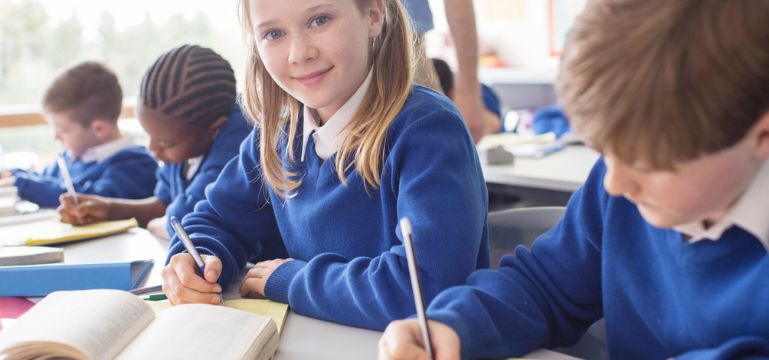The Effects of Drama both on the Spoken and Written Language

Quick links:
Information about the school
Rhiwbeina Primary is a three form entry school serving a predominantly suburban community in north Cardiff. There are 683 pupils on roll. Around 2% are eligible for free school meals and the school has identified around 1% as having additional learning needs (ALN). Approximately 3% have English as an additional language (EAL). The school has a strong creative ethos, priding itself in creating authentic local and cultural links within a cross curricular context.
Context and background to the effective or innovative practice
Rhiwbina and Cardiff have a rich historical heritage that the school has sought to harness to enrich the pupils’ understanding and sense of belonging to their locality and heritage.
The school uses a humanities based ‘thematic’ approach as the driving force behind their curriculum. They use drama effectively to improve pupils’ spoken and written communication. A number of the staff have, over a significant period of time, researched and investigated events, places and people from a range of periods. They use this information to build accessible and inspiring fact-based ‘stories’. Robust historical research, using local libraries and the National Record Office, underpins this approach.
The school has, through this process, established strong community links where pupils regularly visit the places that they are studying in order to consolidate and extend their learning experiences. Interacting with members of the local community, businesses, community groups and public services has been crucial in facilitating this approach.
Description of nature of strategy or activity
Each half-term, every year group studies a new topic, focusing on either local, national or global contexts.
Examples include:
Local:
-
‘Y Ty Glo’, the lives of the Trehafod mining community in 1900.
-
‘The Wenallt Warriors’, lives of members of the Silures Celtic tribe.
-
‘For King and Country’, lives of actual Llandaff residents in the Civil War of 1640s.
-
‘An Orphan’s Tale’, lives of workhouse children in Victorian Cardiff.
-
‘Keep Calm & Carry On’, lives of children evacuated from London to Rhiwbina. Based on the first-hand account of an octogenarian who was evacuated to the area from Tottenham.
National:
-
‘Rebellion 1400’, lives of those supporting the uprising and rebellion of Owain Glyndwr, taken from historical records.
-
‘Pudding Lane 1665’, lives of Pudding Lane inhabitants, taken from the Hearth Tax, during The Great Fire of London.
-
‘Prisoner in the Keep’, lives of the followers of Welsh Princes in 1066.
-
‘Raiders of the Storm’, the lives of Bartholomew Roberts and his crew.
-
‘A Titanic Tragedy’, lives of the passengers and crew and the subsequent enquiry.
Global:
-
‘Guardians of the Planet’, the lives of indigenous Amazon tribes who are under threat from deforestation.
For each of these topics, teachers provide pupils with authentic characters’ names and information based on detailed research for each period. The children then actually ‘live’ as their character for the entire half term, discovering more as their story unfolds, through the use of empathy and suspense. Much of their understanding and empathy with the character is built during drama and spoken activities and followed up through written work in the classroom.
What impact has this work had on provision and pupils’ standards?
Authentic contexts and characters enable the children to:
-
Engage at a deeper level with their learning
-
Develop empathy
-
Become ethical and informed learners, in line with the four purposes, for example ‘I know about my culture, community, society, and the world, both now and in the past’
-
Develop the quality of their spoken language; the sustained role-play allows children to ‘hide’ behind their character, thus developing greater confidence, fluency and expression
-
Explore relevant Religion, Values and Ethics (RVE) issues and dilemmas in a safe context
-
Take ownership of their characters, ‘families and tribes’, which provokes an intensity of feeling, allowing them to explore conflict and its resolution
-
Develop enthusiasm and motivation for creative writing; following drama activities, pupils’ reponses to a range of writing forms, such as diaries, poetry, stories, and persuasive writing, are positive – as they have ‘experienced it’, even reluctant learners have many creative ideas and engage well with their writing
-
Develop the quality of their written language; the scaffolding provided by the drama ensures that the pupils have a clear framework from which to sequence their writing; this particularly benefits less able pupils and, in addition, this approach introduces thematic terminology that provides the children with the vocabulary to enrich their language and writing
How have you shared your good practice?
This good practice has been shared within the school through the delivery of exemplar lessons and team teaching. Good practice has also recently been disseminated more broadly at Language, Literacy and Communication (LLC) liaison link meetings with feeder schools and the local high school.